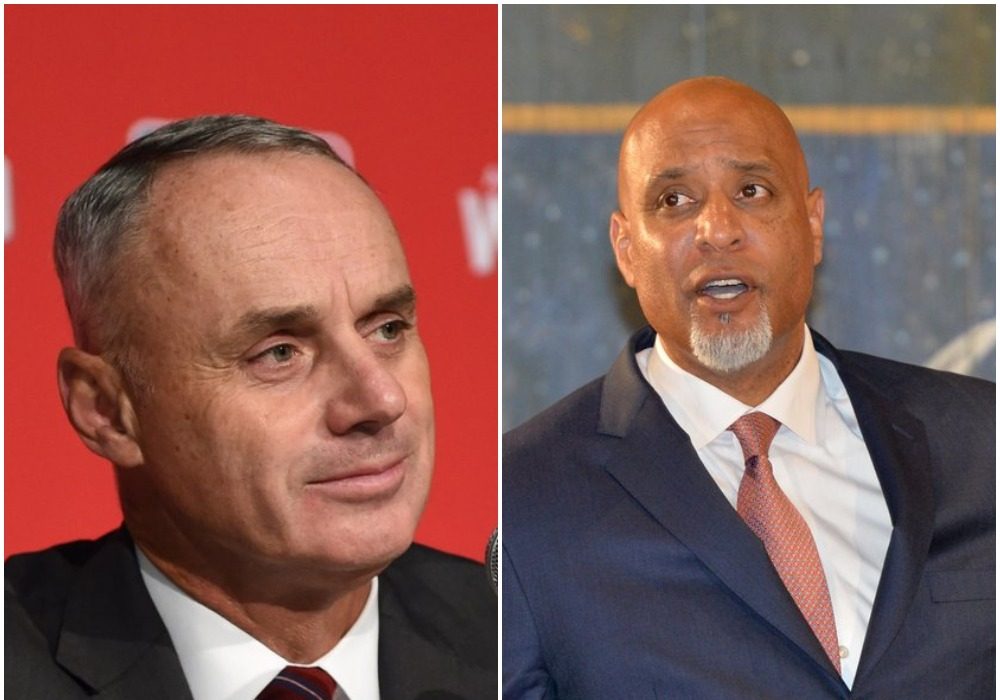
Major League Baseball’s first work stoppage in more than a quarter-century went into effect last night, with the owners unanimously voting to lock the players out until a new collective bargaining agreement is reached. Each of MLB commissioner Rob Manfred and MLB Players Association director Tony Clark met with the media this morning.
Both Manfred and Clark suggested the other side was primarily to blame for the lack of progress to date. Manfred justified the call to lock out within minutes of the previous CBA’s expiration — a decision the owners weren’t legally bound to make — by indicating the MLBPA hadn’t previously been anxious to move talks along. “People need pressure sometimes to get to an agreement, but candidly we didn’t feel that sense of pressure on the other side during the course of this week,” Manfred told reporters (including John Shea of the San Francisco Chronicle).”The only tool available to you under the act is to apply economic leverage.”
Unsurprisingly, Clark pushed back at the assertion the MLBPA had been dallying in negotiations. “From the outset, it seems as if the league has been more interested in the appearance of bargaining than bargaining itself,” Clark claimed (via James Wagner of the New York Times). He also took a swipe at the lengthy “letter to baseball fans” MLB penned in announcing the lockout last night, quipping that “it would have been beneficial to the process to have spent as much time negotiating in the room as it appeared was spent on the letter” (via Chelsea Janes of the Washington Post).
The game’s core economics structure has long been the biggest divide between the parties. Such issues as the service time structure, the number of playoff teams and the competitive balance tax threshold are the particularly strong concerns. Economic discussions have unsurprisingly been the focus of early negotiations, as Manfred said the parties haven’t yet begun to discuss potential on-field rules changes (via Scott Lauber of the Philadelphia Inquirer).
It is generally expected that there’ll be some alterations to the on-field rules. Most around the industry anticipate the introduction of a designated hitter to the National League. Manfred has previously gone on record to voice support for the potential introduction of a pitch clock. Seven-inning doubleheaders and the extra-inning runner of the past two seasons — to date temporary measures — have been topics of debate for fans. It seems those are ancillary negotiation points MLB and the MLBPA will address at a later date, with the broader economic divide the more pressing matter.
It’s not clear when the sides will get back to the table to discuss anything, though. After fairly brief discussions earlier this week seemingly didn’t make much progress, Manfred told reporters this morning no further meetings are currently scheduled (via Evan Drellich of the Athletic). The commissioner added that it was the league’s desire to “get back to the table as quickly as we can.”
The sides will no doubt reconvene at some point, and Manfred again expressed optimism a deal will be reached before the potential loss of any Spring Training or regular season games (via Bob Nightengale of USA Today). That’s a particularly important date for owners, who would first stand to lose revenue in the event of cancellation of games. Manfred has already drawn a clear distinction between an offseason work stoppage and one that threatens play, and we’re still months away from the specter of lost Spring Training revenue.
The players, however, are no doubt less thrilled with the freeze on free agency — and, to a lesser extent, their ability to access team facilities and personnel. While players aren’t in danger of losing salary until games start up, there’s some risk that a shortened transaction window on the eve of the season could leave some players in the cold. There was a flurry of activity before December 1, and the free agent market remained quite strong. Yet the MLBPA has always resisted the possibility of a formal offseason transaction deadline, fearing that teams would have increased leverage to wait players out until the very final stages of free agency in hopes of lowering asking prices.
While the MLBPA has expressed disappointment with the lockout, Clark pushed back against the notion they’ll need to acquiesce to end the transaction freeze quickly. “Players consider (the lockout) unnecessary and provocative,” he said today (Shea link). “The lockout won’t pressure or intimidate players into a deal they don’t believe is fair.“
Read Again Brow https://news.google.com/__i/rss/rd/articles/CBMiW2h0dHBzOi8vd3d3Lm1sYnRyYWRlcnVtb3JzLmNvbS8yMDIxLzEyL3JvYi1tYW5mcmVkLXRvbnktY2xhcmstZGlzY3Vzcy1zdGFydC1vZi1sb2Nrb3V0Lmh0bWzSAQA?oc=5Bagikan Berita Ini














0 Response to "Rob Manfred, Tony Clark Discuss Start Of Lockout - MLB Trade Rumors"
Post a Comment